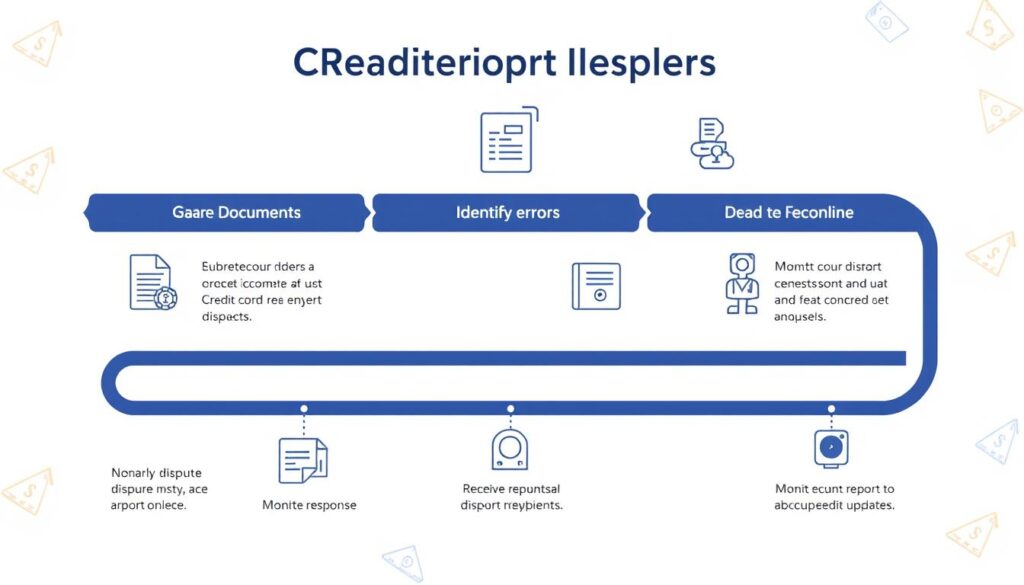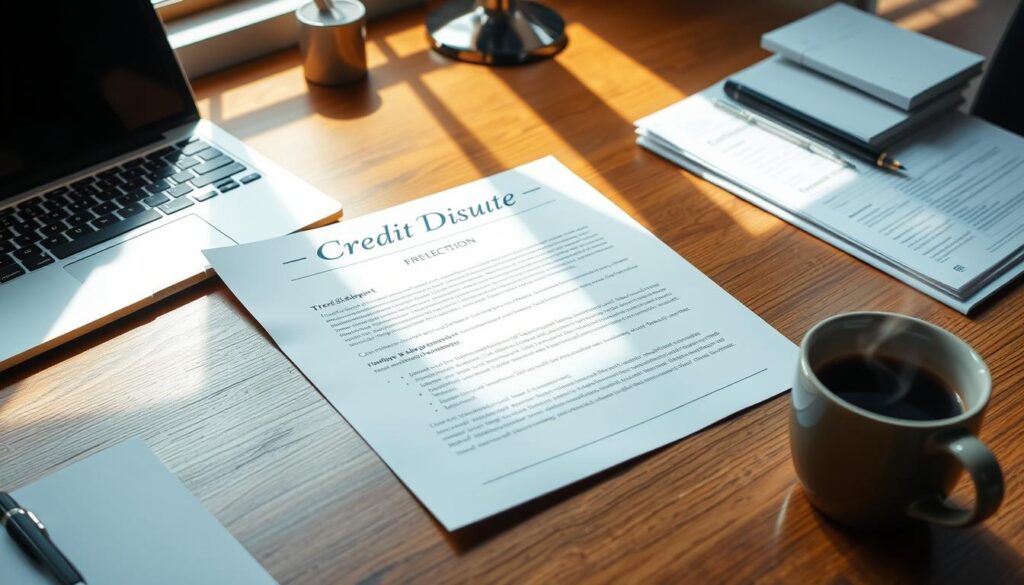An accurate credit report is vital for a healthy financial profile. It affects interest rates on loans, mortgages, and credit cards. Errors in credit reports can lead to unfair decisions and lower credit scores.
You have the power to dispute these inaccuracies. This guide will show you how to challenge discrepancies effectively. You’ll learn to identify errors, gather evidence, and write persuasive dispute letters.
We’ll cover strategies for dealing with identity theft and incorrect late payments. This information will help you take control of your credit report and financial future.
Key Takeaways
- Understand the common types of credit report inaccuracies, such as identity theft, incorrect account information, and outdated data.
- Recognize the impact of credit report mistakes on your credit score and financial well-being.
- Gather supporting documentation to substantiate your credit dispute claims.
- Craft persuasive and effective credit dispute letters to submit to the credit bureaus.
- Navigate the credit dispute process and follow up on the progress of your case.
- Protect your credit rights and stay informed about consumer credit protection laws.
- Achieve success in disputing and removing inaccurate entries from your credit report.
Understanding Credit Report Errors
Your credit report can greatly impact your finances. Errors in these reports are common and can harm your credit score. It’s vital to know about these mistakes and their effects.
Understanding credit report errors helps protect your financial future. By spotting inaccuracies, you can take steps to fix them quickly.
Types of Credit Report Inaccuracies
Credit report errors can take many forms, including:
- Incorrect personal information, such as misspelled names or incorrect addresses
- Accounts that do not belong to you, often a result of identity theft
- Incorrect account statuses, such as reporting a closed account as open
- Inaccurate payment histories, including wrongly reported late or missed payments
- Duplicated accounts or accounts that have been closed but still appear on the report
Impact of Credit Report Mistakes
Credit report errors can have serious consequences. They can lower your credit score, making it harder to get loans or credit cards.
Mistakes can lead to higher interest rates and denied rental applications. They might even stop you from opening a new utility account.
Fixing these errors is key to improving your credit score and keeping your finances stable.
| Type of Credit Report Inaccuracy | Potential Impact |
|---|---|
| Incorrect personal information | Difficulty in verifying identity, potential for identity theft |
| Accounts that do not belong to you | Negative impact on credit score, difficulty in securing credit |
| Incorrect account statuses | Inaccurate representation of credit history, potential for lower credit score |
| Inaccurate payment histories | Negative impact on credit score, difficulty in securing credit |
| Duplicated accounts or closed accounts still appearing | Inaccurate representation of credit history, potential for lower credit score |
Spotting and fixing credit report errors is crucial for improving your credit score. It helps maintain good financial health.
Next, we’ll look at how to dispute and correct these mistakes in your credit report.
Preparing for the Dispute Process
Get your credit reports from Experian, Equifax, and TransUnion. Review each entry carefully to spot any errors. This step is vital for an effective dispute process.
Collect documents to support your claims. These may include payment records, billing statements, and creditor correspondence. Strong evidence boosts your chances of resolving disputes successfully.
- Obtain credit reports from Experian, Equifax, and TransUnion
- Review each entry on your credit reports for potential errors
- Gather supporting documentation, such as payment records and billing statements
- Prepare to submit a detailed and well-supported credit report dispute
Good preparation strengthens your position for addressing inaccuracies. It sets you up for a successful credit report dispute. This proactive approach helps protect your financial health.

Step-by-Step Guide to Online Credit Report Disputes
Fixing credit report errors is crucial for your financial health. This guide will help you dispute errors online effectively. Follow these steps to boost your chances of success.
Gather Supporting Documentation
Start by collecting all necessary documents for your dispute. Get credit reports from Experian, Equifax, and TransUnion. Gather proof of inaccuracies like billing statements and payment records.
Include any previous correspondence with credit bureaus or creditors about the errors. This documentation for credit dispute will strengthen your case during the investigation.
Submit Disputes to Credit Bureaus
Use online dispute portals offered by credit bureaus to submit your claims. This method is fast and convenient for submitting credit dispute online. Clearly explain the errors and provide your supporting evidence.
Request that credit bureaus investigate and correct the issues. Keep track of confirmation numbers or case IDs for follow-up purposes.
By following this process, you can effectively dispute credit report online. This approach increases your chances of removing inaccuracies and improving your credit standing.
Effective Credit Dispute Letter Strategies
A well-written credit dispute letter is key to resolving online credit report issues. Understanding its crucial elements helps you communicate effectively with credit bureaus. This increases your chances of a positive outcome.
Key Elements of a Persuasive Dispute Letter
Focus on these key elements to create an effective credit dispute letter:
- Clear Identification of the Inaccuracy: Precisely identify the specific error on your credit report. Include details like account number, date, and the exact incorrect information.
- Detailed Explanation: Clearly explain why the information is inaccurate or misleading. Provide a thorough account of the facts surrounding the disputed item.
- Supporting Documentation: Include relevant evidence that supports your dispute. This can be payment receipts, billing statements, or creditor correspondence.
- Specific Request: Clearly state the action you want the credit bureau to take. This could be removing the disputed item or correcting inaccurate information.
- Persuasive Language: Use polite, firm language to convey your case. Avoid aggression and focus on presenting a well-reasoned, compelling argument.
Incorporating these elements creates a strong case that effectively communicates your concerns. It helps you present your argument clearly to credit bureaus.

“A well-crafted credit dispute letter can be the difference between a successful resolution and a prolonged credit dispute process.”
Effective strategies are crucial for navigating online credit report disputes. Following these best practices increases your chances of successfully disputing inaccurate information.
Remember, a well-written letter can lead to faster resolution of credit issues. It’s a powerful tool in maintaining your financial health.
How to Dispute Credit Report Online and Win
Disputing credit report errors online can seem overwhelming. However, with the right approach, you can challenge inaccuracies and boost your credit score. Success hinges on persistence, attention to detail, and understanding the process.
Gathering extensive documentation is crucial for winning disputes. Collect all relevant statements, receipts, and records to support your case. This evidence will help convince credit bureaus to investigate and correct errors.
- Carefully review your credit report and identify the specific errors you want to dispute.
- Obtain copies of your credit reports from all three major bureaus (Experian, Equifax, and TransUnion).
- Gather any supporting documentation that proves the reported information is inaccurate.
- Familiarize yourself with the credit bureaus’ dispute processes and follow their guidelines precisely.
- Persist with your dispute even if the initial response is unsatisfactory. Credit bureaus are required to investigate and respond to your concerns.
Winning credit report disputes often requires patience. Don’t lose heart if the process takes time. By following these strategies, you can successfully dispute errors and improve your financial future.
“Persistence and attention to detail are the keys to winning credit report disputes. With the right approach, you can get the inaccuracies on your report corrected and improve your credit standing.”
Consider seeking help from a credit repair specialist. These professionals can guide you through the process. They ensure you meet deadlines and advocate on your behalf.
| Dispute Strategy | Success Rate | Average Time to Resolution |
|---|---|---|
| Gather supporting documentation | 78% | 2-3 months |
| Follow credit bureau dispute guidelines | 65% | 1-2 months |
| Persist with the dispute process | 85% | 3-6 months |
Use these proven strategies to boost your chances of success. You can effectively dispute credit report errors and reclaim your financial well-being.
Following Up on Disputes
Disputing credit report errors is vital for a healthy financial profile. Tracking dispute progress and understanding credit bureau timelines are crucial for a good outcome.
Following up ensures your financial information stays accurate. It’s a key step in maintaining your creditworthiness.
Timelines for Credit Dispute Resolution
The Fair Credit Reporting Act (FCRA) gives credit bureaus 30 days to investigate disputes. They can extend this by 15 days if needed.
Regular follow-ups on your dispute status are important. Stay on top of the process to protect your interests.
Next Steps After Credit Report Dispute
If credit bureaus don’t resolve your issue satisfactorily, you have options. You can escalate by providing more documentation or requesting a reinvestigation.
Another option is contacting the Consumer Financial Protection Bureau (CFPB). They can help file a complaint and offer additional assistance.
| Action | Timeframe | Outcome |
|---|---|---|
| Submit credit report dispute | 30 days | Credit bureau response |
| Request reinvestigation | 45 days | Revised credit report |
| File complaint with CFPB | Varies | Further investigation and resolution |
Persistence is key in the credit dispute process. Know your rights and timelines to effectively follow up on credit report disputes.
This knowledge helps you take the necessary next steps. Ensure your credit report accurately shows your financial history.
Dealing with Persistent Credit Report Errors
Fixing credit report errors is vital for an accurate financial history. There are strategies to help you succeed in this process. It’s important to know your rights and available resources.
The Fair Credit Reporting Act (FCRA) protects consumers. It requires credit bureaus to investigate disputes and fix verified errors. Knowing your FCRA rights empowers you to take action against persistent issues.
If standard disputes fail, try alternative resolution methods. These may include credit repair services or legal action. Such approaches can effectively resolve how to handle persistent credit report errors and strategies for resolving long-term credit report issues.
Persistence is key in credit report error resolution. Use available resources and explore different dispute options. This way, you can overcome stubborn errors and ensure accurate credit reports.
| Dispute Method | Advantages | Disadvantages |
|---|---|---|
| Standard Dispute Process | Free, accessible, and legally required by credit bureaus | Can be time-consuming, and errors may persist despite disputes |
| Credit Repair Services | Expertise and resources to handle disputes effectively | Fees involved, and success is not guaranteed |
| Mediation or Legal Action | Potential for more successful resolution of persistent issues | Can be more costly and time-consuming than other options |
“Patience and persistence are vital qualities in the ultimate success of any cause.” – Napoleon Hill
Protecting Your Credit Rights
Knowing your legal rights is vital when disputing credit report errors. The Fair Credit Reporting Act (FCRA) and Fair Debt Collection Practices Act (FDCPA) empower you to challenge inaccuracies. These laws hold credit bureaus and creditors accountable.
Consumer Credit Protection Laws
The FCRA gives you the right to access your credit report and dispute errors. It also allows you to seek damages for law violations.
The FDCPA shields you from unfair debt collection practices. It ensures your credit report information is protected.
These consumer credit protection laws help you dispute credit report issues. They safeguard your financial well-being and maintain your credit report’s accuracy.

“Understanding your credit report dispute rights is the first step in taking control of your financial future.”
Knowledge is power in protecting your consumer credit. Familiarize yourself with these key laws and exercise your rights.
This ensures your credit report accurately reflects your financial history. It also safeguards your overall financial well-being.
Conclusion
Disputing credit report errors online can boost your credit score and financial health. Learn about inaccuracies, gather documents, and use effective strategies. Be persistent and know your rights for the best outcome.
Take charge of your financial future with this guide. Disputing credit report errors online and winning is key to a healthy credit report dispute process summary. Follow the next steps for credit report dispute to improve your credit report’s accuracy.
Fixing credit report errors opens doors to financial opportunities. You can get better loan rates and qualify for good insurance premiums. It may even help with job prospects.
Make sure your credit report truly shows your financial history. Take action today to improve your creditworthiness.

